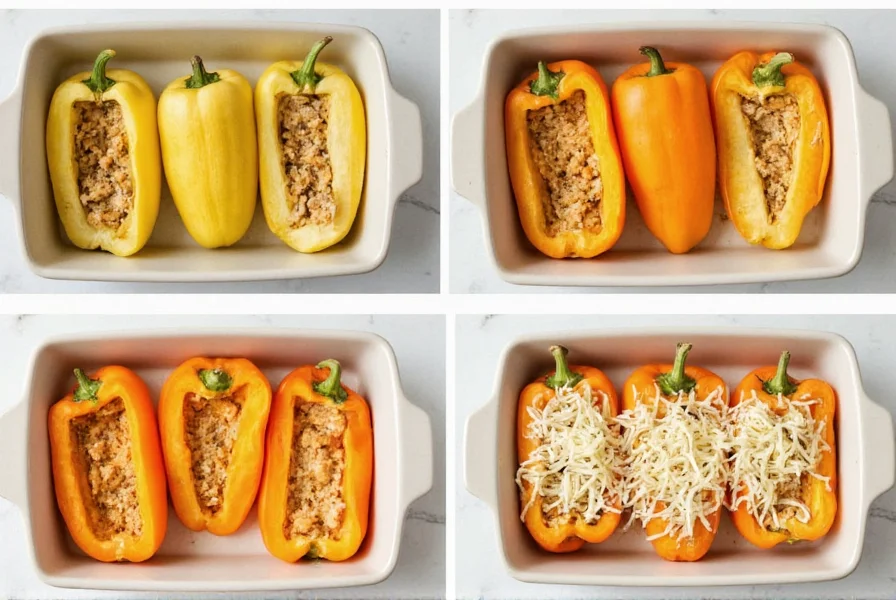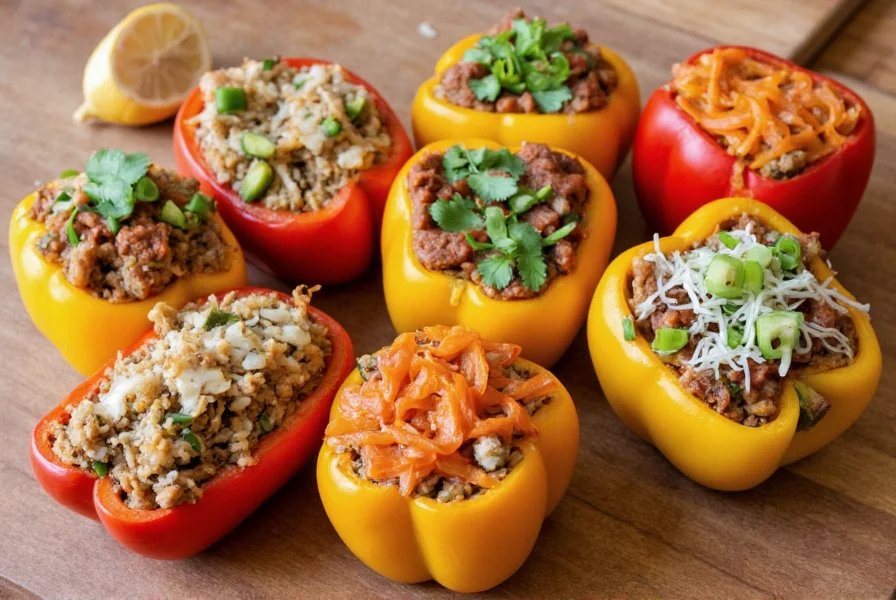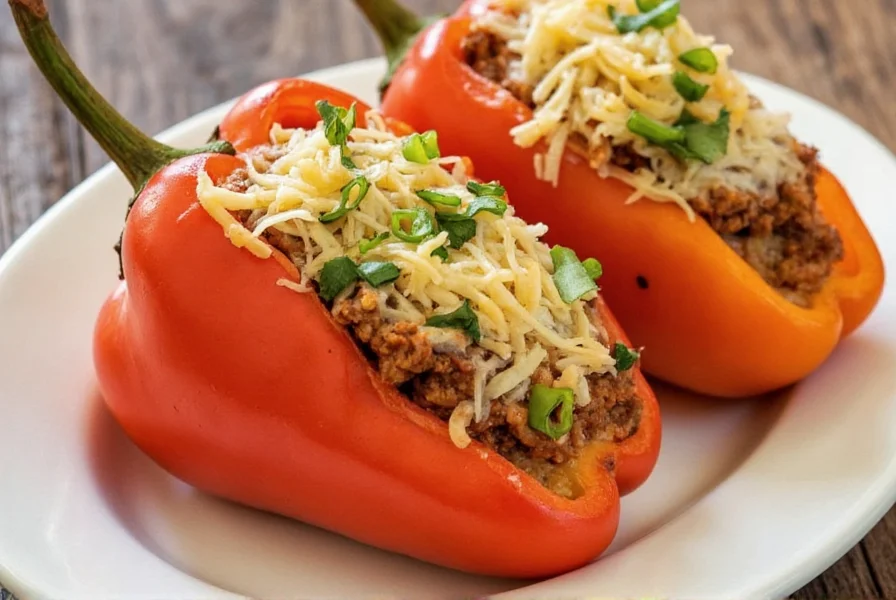Creating perfect stuffed pepper squash recipes requires understanding the balance between the vegetable vessels and their flavorful fillings. This dish has gained popularity among home cooks seeking healthy, visually appealing meals that accommodate various dietary preferences. Unlike traditional stuffed peppers that use only bell peppers, incorporating squash adds natural sweetness, additional nutrients, and a beautiful color contrast that elevates the presentation.
The Essential Components of Great Stuffed Pepper Squash
Successful stuffed pepper squash recipes share several key elements that transform simple ingredients into memorable meals. The foundation begins with selecting the right vegetables. Choose firm, brightly colored bell peppers without soft spots, and medium-sized summer squash or zucchini that feel heavy for their size. These quality ingredients form the structural base that holds your filling while contributing their own subtle flavors.
When preparing your stuffed pepper squash recipes, proper vegetable preparation makes all the difference. Many home cooks make the mistake of undercooking or overcooking the pepper-squash vessels. The ideal technique involves partially roasting the hollowed vegetables for 15-20 minutes before filling. This step softens them enough to eat comfortably while maintaining their shape during the final baking process. For best results, lightly salt the inside surfaces after hollowing to draw out excess moisture that could make your filling soggy.
| Vegetable Type | Preparation Time | Best Filling Pairings | Flavor Profile |
|---|---|---|---|
| Bell Peppers (any color) | 15-20 minutes | Rice-based, meat, quinoa | Sweet, mild |
| Yellow Squash | 12-15 minutes | Vegetarian, grain-free | Delicate, buttery |
| Zucchini | 10-12 minutes | Low-carb, meatless | Mild, slightly sweet |
| Pattypan Squash | 8-10 minutes | Seafood, herb-focused | Nutty, earthy |
Classic Baked Stuffed Pepper Squash Recipe
For a reliable stuffed pepper squash recipe that works every time, follow this straightforward method that produces restaurant-quality results. Begin by selecting 4 medium bell peppers (mixed colors for visual appeal) and 2 medium yellow squash. Cut the tops off the peppers, remove seeds and membranes, then slice the squash lengthwise and scoop out the centers, leaving about 1/4-inch thickness to maintain structure.
Place the hollowed vegetables cut-side down on a parchment-lined baking sheet and roast at 375°F for 15 minutes. While vegetables roast, prepare your filling: cook 1 cup quinoa according to package directions, sauté 1 diced onion and 2 minced garlic cloves until translucent, then add 1 pound lean ground turkey (or plant-based alternative) and cook until browned. Combine with quinoa, 1 cup diced tomatoes, 1/2 cup corn, 1/4 cup chopped fresh herbs, and seasonings. Fill each pepper-squash combination, top with a sprinkle of cheese if desired, and bake another 20-25 minutes until vegetables are tender and filling is heated through.

Variations for Different Dietary Needs
One of the greatest strengths of stuffed pepper squash recipes is their adaptability to various dietary requirements. For gluten-free versions, ensure your grain components (like quinoa or rice) are certified gluten-free. Vegetarian stuffed pepper squash recipes work beautifully with black beans, lentils, or chickpeas as protein sources, while adding walnuts or pecans provides satisfying crunch and healthy fats.
When creating low-carb stuffed pepper squash recipes, replace traditional grains with cauliflower rice or finely diced mushrooms that have been sautéed to remove excess moisture. For dairy-free options, skip cheese toppings or use nutritional yeast for that savory umami flavor without dairy. Mediterranean-style stuffed pepper squash recipes shine with feta cheese (omit for dairy-free), kalamata olives, and oregano, while Southwest variations benefit from cumin, chili powder, and black beans.
Pro Tips for Perfect Stuffed Pepper Squash Every Time
Professional chefs know several tricks that elevate homemade stuffed pepper squash recipes from good to exceptional. First, always salt the inside of your hollowed vegetables and let them sit for 10 minutes before roasting. This draws out excess moisture that would otherwise make your filling watery. Second, underfill rather than overfill your vegetables—leave about 1/2 inch at the top to prevent spillage during baking.
For meal prep friendly stuffed pepper squash recipes, prepare the components separately and assemble just before baking. Cooked fillings can be refrigerated for up to 3 days or frozen for longer storage. When reheating leftovers, add a splash of broth or water to maintain moisture, and cover with foil for the first 10 minutes of reheating to prevent drying out. For entertaining, consider making mini stuffed pepper squash using baby bell peppers and crookneck squash for impressive individual portions.

Nutritional Benefits of Stuffed Pepper Squash
Stuffed pepper squash recipes deliver impressive nutritional profiles that make them ideal for health-conscious eaters. Bell peppers provide more vitamin C than oranges, while squash contributes vitamin A, potassium, and dietary fiber. When properly prepared, a single serving contains approximately 300-400 calories with balanced macronutrients: 15-20g protein, 45-55g carbohydrates (mostly complex), and 10-15g healthy fats from ingredients like olive oil and cheese.
The combination of vegetables, lean protein, and whole grains creates a meal with a low glycemic index that helps maintain stable blood sugar levels. The high fiber content (8-10g per serving) promotes digestive health and creates lasting satiety, making stuffed pepper squash recipes excellent choices for weight management. For maximum nutrient retention, avoid overcooking the vegetables and use fresh herbs rather than dried when possible.
Frequently Asked Questions
Can I prepare stuffed pepper squash recipes ahead of time?
Yes, you can prepare stuffed pepper squash recipes up to 24 hours in advance. Assemble the stuffed vegetables, cover tightly, and refrigerate. Add 5-10 minutes to the baking time if cooking from cold. For longer storage, freeze unbaked stuffed peppers for up to 3 months—thaw in the refrigerator before baking.
How do I prevent my stuffed pepper squash from becoming soggy?
To prevent sogginess in stuffed pepper squash recipes, always salt the hollowed vegetables and let them drain for 10 minutes before roasting. Partially bake the vegetables first, and avoid overfilling with wet ingredients. If using tomatoes or other high-moisture components, drain them well or cook down to reduce liquid content before adding to your filling.
What are the best grains to use in stuffed pepper squash recipes?
The best grains for stuffed pepper squash recipes include quinoa (complete protein), brown rice (nutty flavor), farro (chewy texture), and couscous (quick cooking). For grain-free options, cauliflower rice works well but should be sautéed first to remove excess moisture. Each grain brings different nutritional benefits and textures that complement the vegetable vessels.
Can I make stuffed pepper squash recipes vegan?
Absolutely! Vegan stuffed pepper squash recipes work beautifully by using plant-based proteins like lentils, black beans, chickpeas, or crumbled tofu. Replace cheese with nutritional yeast for cheesy flavor, and use vegetable broth instead of meat-based stocks. Many traditional stuffed pepper squash recipes are naturally vegetarian and easily adapted to vegan diets with these simple substitutions.
What side dishes pair well with stuffed pepper squash?
Stuffed pepper squash recipes pair well with simple green salads, roasted asparagus, or garlic sautéed spinach. For heartier meals, consider serving with crusty whole-grain bread or a light soup. Since stuffed pepper squash contains vegetables, protein, and carbohydrates, it often serves as a complete meal on its own, making additional sides optional rather than necessary.











 浙公网安备
33010002000092号
浙公网安备
33010002000092号 浙B2-20120091-4
浙B2-20120091-4